Matt Rees's Blog - Posts Tagged "france"
Krimis, polars, gialli: what crime novels are called around the world
Sometimes people talk about crime novels as though they were all the same. The sheer number of different names for variants of the crime novel proves that isn’t true.
Police procedural. Mystery novel. Thriller. Cosy. Exotic detective. Supernatural. I used to think there was little real difference, but then my UK publisher told me he wanted to change the title of my first novel “The Collaborator of Bethlehem.” He thought it sounded like a thriller (which men typically buy) and he wanted it to be clear that it was a mystery (so that women would buy it.) He changed the title in Britain to “The Bethlehem Murders.” I had to acknowledge that he was right: it sounds more like a mystery, doesn’t it.
And that’s only in English.
As I travel around to promote my books in different countries (I’m published in 22 countries these days), I’ve noticed that there are interesting variations on the names we use in English for crime novels. Some of them are quite entertaining, and some of them tell us something revealing about how the genre developed in that country.
Take Italy. Mystery novels there are called “gialli,” or yellows. That’s because traditionally the genre was published with a yellow cover. Even today the mystery shelves of Italian bookshops are largely yellow.
Color is the theme also in Spain, where crime novels are “novelas negras,” black novels. According to a source of mine on the literary desk of El Pais, the big Spanish newspaper, this harks back to the old “Serie noire” of French publisher Gallimard. That series introduced the crime novel to Spain. So noir, or black, became the identifying color for a crime novel.
A “roman noir,” black novel, is also one of the ways of referring to a crime novel in France, because of that Gallimard series. But the most common slang for a mystery in French is “un polar.” It’s a contraction of “roman policier,” police novel, and was first recorded in 1968. If you ask most French people to explain the origin of the word “polar,” they can’t tell you: the abbreviation has become so common, they’ve forgotten its rather simple derivation.
Germany (as well as the Scandinavian countries) calls a crime novel “ein Krimi,” short for the word Kriminelle, criminal. No surprise there. It’s a catch-all for thrillers and detective stories of all kinds.
There is, however, an amusing sub-genre in German. In English, the “cosy” refers to Miss Marple-type novels in which the detective is an amateur, usually a lady (not just a woman), probably an inhabitant of a quaint village, investigating a murder in a country house or a vicarage.
The Germans call these cosies “Häkel-Krimis“. Miriam Froitzheim, who works at my German publisher C.H. Beck Verlag in Munich, translates this as “Crochet Crime Novels.” Because, as she puts it, the detective “puts her crochet gear away to solve the murder.”
I’ll keep scouting for interesting ways of describing crime novels around the world. But if you know of some others, tell me about them.
Police procedural. Mystery novel. Thriller. Cosy. Exotic detective. Supernatural. I used to think there was little real difference, but then my UK publisher told me he wanted to change the title of my first novel “The Collaborator of Bethlehem.” He thought it sounded like a thriller (which men typically buy) and he wanted it to be clear that it was a mystery (so that women would buy it.) He changed the title in Britain to “The Bethlehem Murders.” I had to acknowledge that he was right: it sounds more like a mystery, doesn’t it.
And that’s only in English.
As I travel around to promote my books in different countries (I’m published in 22 countries these days), I’ve noticed that there are interesting variations on the names we use in English for crime novels. Some of them are quite entertaining, and some of them tell us something revealing about how the genre developed in that country.
Take Italy. Mystery novels there are called “gialli,” or yellows. That’s because traditionally the genre was published with a yellow cover. Even today the mystery shelves of Italian bookshops are largely yellow.
Color is the theme also in Spain, where crime novels are “novelas negras,” black novels. According to a source of mine on the literary desk of El Pais, the big Spanish newspaper, this harks back to the old “Serie noire” of French publisher Gallimard. That series introduced the crime novel to Spain. So noir, or black, became the identifying color for a crime novel.
A “roman noir,” black novel, is also one of the ways of referring to a crime novel in France, because of that Gallimard series. But the most common slang for a mystery in French is “un polar.” It’s a contraction of “roman policier,” police novel, and was first recorded in 1968. If you ask most French people to explain the origin of the word “polar,” they can’t tell you: the abbreviation has become so common, they’ve forgotten its rather simple derivation.
Germany (as well as the Scandinavian countries) calls a crime novel “ein Krimi,” short for the word Kriminelle, criminal. No surprise there. It’s a catch-all for thrillers and detective stories of all kinds.
There is, however, an amusing sub-genre in German. In English, the “cosy” refers to Miss Marple-type novels in which the detective is an amateur, usually a lady (not just a woman), probably an inhabitant of a quaint village, investigating a murder in a country house or a vicarage.
The Germans call these cosies “Häkel-Krimis“. Miriam Froitzheim, who works at my German publisher C.H. Beck Verlag in Munich, translates this as “Crochet Crime Novels.” Because, as she puts it, the detective “puts her crochet gear away to solve the murder.”
I’ll keep scouting for interesting ways of describing crime novels around the world. But if you know of some others, tell me about them.
Review: Haitian scandal, voodoo and family obsession with Cara Black
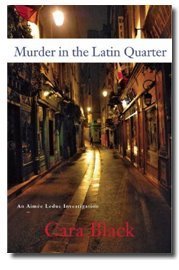
Murder in the Latin Quarter
by Cara Black
Soho Crime, isbn 1569475415
Just when our detective is set to get down to some normal, profitable work, a woman walks into her office with a story that sets our mystery on a personal track. It’s a tested opening for a detective novel, but Cara Black’s version of it has an originality and freshness that works well. The detective is Aimée Leduc, a Parisian computer-security expert, and the mystery woman is an illegal Haitian immigrant who claims to be Leduc’s half-sister. On her first attempt to get more details from the supposed sister, Leduc discovers the murdered body of a Haitian scientist and realizes that the newcomer may be involved in something more than family genealogy.
The ninth episode in Black’s series of Paris detective novels takes Leduc through a plot involving voodoo, corrupt businessmen, and scandal in Haiti. But it remains rooted in the streets of Paris. Leduc ends up crawling through windows and tunnels, covered in the muck of the City of Light. It’s a good image for the way Black keeps the novels grounded there. Paris may be everyone’s idea of a romantic city, but to those who know it it’s also a place of “diversity”—a nice modern way of saying that there are many awful inequities. “Murder in the Latin Quarter” is a fine way to slap some reality onto those vacation memories and to get a picture of the varied life in the French capital.
As an episode in a lengthy series of novels, there are also intriguing developments in Leduc’s obsession with family--her radical mother abandoned her as a girl, and her policeman father was murdered, so it’s easy to see why she ponders the issue a lot. The possible blood connection to the Haitian woman drives Leduc through the dangers of the book, and by the end it’s clear that the same urge will be eating at her until the welcome arrival of the next novel by Cara Black.
French mystery trove
For those who happen to read some French, Planete Polar is a wonderful source of news and reviews about crime fiction, crime writers, and movie offshoots. It's written by Philippe Lemaire, cultural correspondent for Le Parisien. Philippe's a delightful fellow who's interviewed me a couple of times -- once in Paris, and also in Bethlehem when he came to write about my first crime novel The Collaborator of Bethlehem. One of my favorite recent posts on Planete Polar is his amusing assessment of a "slightly mad" book about the crime novels of Fred Vargas. His blog isn't restricted to French writers, of course ("Polar" is the French word for crime novels, and "Planete"...well, even a Parisian would admit that there's more to the planet than French novels) and Philippe has access to all the big writers from around the world visiting Paris for publication of their latest books. Take a look at Philippe's newest post, in which he decidedly gets under the skin of Douglas Kennedy....
Everything's better in Paris
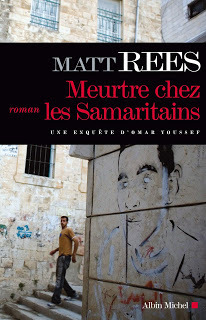
It’s great to hear good news. It’s even better to hear it when you’ve just arrived in Paris. Everything sounds better when you hear it in Paris.
Last week I had a few days in the French capital courtesy of my publisher Albin Michel, which brought me over for the release of my third Palestinian crime novel “Meurtre chez les Samaritains” (English title: “The Samaritan’s Secret”).
On arrival my publicist, a delightful Marseillaise named Agnes Chalnot who works with the elegantly Parisienne Florence Godfernaux, informed me that the first of my Palestinian crime novels “Le Collaborateur de Bethleem” (“The Collaborator of Bethlehem” in the US; "The Bethlehem Murders" in the UK) had been shortlisted for the Prix des Livres de Poche. The winner will be announced in the autumn, but in the meantime it was a lovely way to start my visit.
Albin Michel usually puts me up in the Hotel Lennox, just around the corner from their offices in Montparnasse (that’s the 14th Arondissement, if the numbers make sense to you as they spiral out from the very center of Paris…). It’s a fabulous old artistic area. Norwegian-born photographer Ulf Andersen has lived in the neighborhood a long time and, as we walked about, he showed me the atelier where Picasso used to work, the café where Sartre (“He was very ugly,” Ulf remembers) used to have his morning coffee, and the art deco Hotel Aiglon where Bunuel used to stay when he visited Paris. Nowadays Montparnasse is a bit too pricey for artists, who tend to live in the area near the Bastille.
I enjoy returning each year to Paris when my books come out. Partially that’s because of the culture of books and intellectualism that’s specific to France. The head of Albin Michel who’s a great supporter of my books, Olivier Betourne, used to be the editor of Jacques Derrida, the great deconstructionist philosopher, and my editor Vaiju Naravane is a polymath Indian woman who’s able to tell hilarious tales of trekking to the furthest regions of southern India with Shiva Naipaul.
It’s also because I’ve come to know some of the journalists I meet quite well, particularly those like Philippe Lemaire of Le Parisien and Vladimir de Gmeline of Valeurs Actuelles who have been out to Jerusalem to tour the West Bank with me. This year Philippe remarked that I seemed more relaxed than when my last book came out. I was pleased to hear it, and I must credit my wife Devorah and my son Cai for calming me down!
Another friend I was glad to see during my quick visit was Francois Busnel. He’s one of the most important literary journalists in France and he has an approach to his work that’s vastly different from most of those who write about books. Francois came to Jerusalem to write about me a couple of years ago. He travels each month to interview writers around the world. This summer he’s spending a few weeks in Afghanistan with his friend Kabul-born Atiq Rahimi, who won the Prix Goncourt last year. Not your typical book reviewer, as you can see. If you read French, take a look at his articles in L’Express. They’re excellent.
With only a few hours left in Paris, I picked up a Quiche Lorraine and feuillete de Roquefort near the parliament. The quiche you probably know has chunks of ham. The feuillete is a rich, rich pastry packed with Roquefort, and frankly it was a little too intense for me. But as I sat in the Jardins du Luxembourg with my pastries, watching the French reading books (not playing with Blackberrys) beneath the massive bust of Paul Verlaine, I wished I could take a little of their ethos home with me.
Lecture en francais a Jerusalem
Je fais une lecture en francais chez la librairie francaise a Jerusalem ce mois. Voici les detailles :
«Meurtre chez les Samaritains» de Matt Rees, Editions Albin Michel
Tout est possible en Palestine, et rien ne dit que le jeune Ishaq, le fils du prêtre des Samaritains de Naplouse, n’a pas été exécuté parce qu’il était homosexuel. Rien ne dit non plus que sa connaissance intime des caisses noires du Vieux, l’ancien Président de l’Autorité palestinienne, ne lui a pas été fatale. Après Le Collaborateur de Bethléem (qui vient de sortir en poche) et Une tombe à Gaza, qui ont installé Matt Rees comme l’un des maîtres du polar, cette troisième enquête d’Omar Youssef quadrille le labyrinthe de la casbah de l’antique cité de Cisjordanie et explore les arcanes de l’univers des Samaritains.
"Omar Youssef est le Marlowe de la rue arabe." NewYork Magazine
Matt REES sera à la librairie et signera ses livres le dimanche 28 Juin à 18h30
Librairie Vice-Versa
par téléphone: 02-6244412
par fax: 02-6244112
par mail: lib@viceversalib.com – Notre site: viceversalib.com
«Meurtre chez les Samaritains» de Matt Rees, Editions Albin Michel
Tout est possible en Palestine, et rien ne dit que le jeune Ishaq, le fils du prêtre des Samaritains de Naplouse, n’a pas été exécuté parce qu’il était homosexuel. Rien ne dit non plus que sa connaissance intime des caisses noires du Vieux, l’ancien Président de l’Autorité palestinienne, ne lui a pas été fatale. Après Le Collaborateur de Bethléem (qui vient de sortir en poche) et Une tombe à Gaza, qui ont installé Matt Rees comme l’un des maîtres du polar, cette troisième enquête d’Omar Youssef quadrille le labyrinthe de la casbah de l’antique cité de Cisjordanie et explore les arcanes de l’univers des Samaritains.
"Omar Youssef est le Marlowe de la rue arabe." NewYork Magazine
Matt REES sera à la librairie et signera ses livres le dimanche 28 Juin à 18h30
Librairie Vice-Versa
par téléphone: 02-6244412
par fax: 02-6244112
par mail: lib@viceversalib.com – Notre site: viceversalib.com
Published on June 18, 2009 00:42
•
Tags:
appearances, book, crime, fiction, france, israel, jerusalem, samaritan-s, secret, tour
Is the heat getting to me?
I'm taking a break of a couple of weeks between drafts of my latest novel. To clear my head and to allow my body to accustom itself to a step up in desert heat here in Jerusalem (it's hard to concentrate the first day the temperature hits 35 degrees, particularly when you write standing up as I do). So it's good to have reminders of how my novels are establishing themselves on the international thriller and mystery scene.
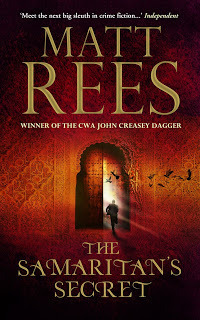
In the post yesterday, I received some copies of the small-format UK version of my third Palestinian crime novel THE SAMARITAN'S SECRET from my editor at Atlantic, the delightful Sarah Norman. The large format edition, published in January, was green. The new one, which'll be published on July 1, is brown. I like it because it's slightly larger (B format in publishing parlance) than the tiny A-format versions of my first two novels, released in the UK as THE BETHLEHEM MURDERS and THE SALADIN MURDERS.
Over at my agent's office, I also picked up copies of my first novel in the French pocketbook version. LE COLLABORATEUR DE BETHLEEM (as THE COLLABORATOR OF BETHLEHEM is known to thin, well-coutured ladies and men who shrug a lot when they say "Boff!") has been nominated for the Prix des Lecteurs des Livres de Poche.
Before I tracked across my agent's courtyard with my pile of French pocket books, I signed a contract for the publication of my first novel in Greek. I'll be with Kastaniotis Editions in Athens. Thus my shelf of foreign-language books will now test my language abilities with one which will be "all Greek to me" and, as my second book came out this month in Holland, "double Dutch."
Maybe the heat's getting to me. With wordplay like that, I ought to get back to the next draft of my novel....

In the post yesterday, I received some copies of the small-format UK version of my third Palestinian crime novel THE SAMARITAN'S SECRET from my editor at Atlantic, the delightful Sarah Norman. The large format edition, published in January, was green. The new one, which'll be published on July 1, is brown. I like it because it's slightly larger (B format in publishing parlance) than the tiny A-format versions of my first two novels, released in the UK as THE BETHLEHEM MURDERS and THE SALADIN MURDERS.
Over at my agent's office, I also picked up copies of my first novel in the French pocketbook version. LE COLLABORATEUR DE BETHLEEM (as THE COLLABORATOR OF BETHLEHEM is known to thin, well-coutured ladies and men who shrug a lot when they say "Boff!") has been nominated for the Prix des Lecteurs des Livres de Poche.
Before I tracked across my agent's courtyard with my pile of French pocket books, I signed a contract for the publication of my first novel in Greek. I'll be with Kastaniotis Editions in Athens. Thus my shelf of foreign-language books will now test my language abilities with one which will be "all Greek to me" and, as my second book came out this month in Holland, "double Dutch."
Maybe the heat's getting to me. With wordplay like that, I ought to get back to the next draft of my novel....
Published on June 26, 2009 00:13
•
Tags:
athens, awards, bethlehem, collaborator, france, greece, holland, israel, jerusalem, kastaniotis, murders, omar, palestinians, samaritan-s, secret, yussef
11 arrondissements to go: Cara Black’s Writing Life
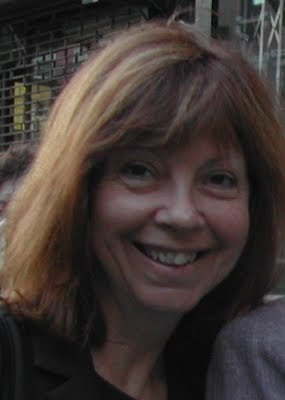
Each of Cara Black’s titles takes her computer-security PI Aimee Leduc on the trail of a murder in a different quartier of Paris -- Montmartre, Clichy, Bastille. Aren't those names alone enough to make you want to read them? The latest is Murder in the Latin Quarter, where Aimee tries to trace a Haitian woman who turns up in her office to tell her that she’s her sister. One of the pleasures of a long, developing series like Black’s is that we’ve come to know the detective and her family backstory – radical mother and police detective father – over the course of eight previous books, giving the appearance of a putative sister an extra sting beyond the impetus it gives to the plot of Murder in the Latin Quarter. In much the same way, we’re getting a gradual underground tour of the real Paris. As Cara points out, she has 11 arrondissements (districts) to go. I hope that at that point she won't quit: Paris has a lot of suburbs.
How long did it take you to get published? Three and a half years.
Would you recommend any books on writing? Bird by Bird by Anne Lamott. How to Write a Damn Good Novel by James N. Frey
What’s a typical writing day? Up early, coffee, feed the dog and hit the laptop for several hours. I take a break during the day then at four o'clock it's more coffee and back at the laptop. I re-read and revise the morning's work or often continue a scene working for as long as it takes.
Plug your latest book. What’s it about? Why’s it so great? Murder in the Latin Quarter takes place in September 1997 set against the aftermath of Princess Diana's death. A woman claiming to be Aimée's half sister disappears and in trying to find her Aimée discovers the body of a visiting Haitian professor at one of the Grands Ecole's surrounded by a ritual circle of salt. Her investigation leads to back door politics involving the World Bank, the IMF, human traffikers and personal insight into her own past. Murder in the Latin Quarter gave me a chance to explore and go deep into areas of the Left Bank I'd never known about before. The faded charm of the still intellectual center, the old Roman baths, the quarries under old Roman roads used and renamed today.
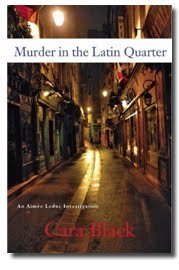
How much of what you do is: a) formula dictated by the genre within which you write? b) formula you developed yourself and stuck with? c) as close to complete originality as it’s possible to get each time? I'm not sure this is a strict answer but one of the reasons I love reading crime fiction stems from knowing that the framework, ie. an investigation, provides a map to follow in the story. The books I read use this framework in a different, fresh way and provide a resolution. Some form of justice is served. So that's what I aim for in my books, something we get so little of in real life. Since each of my nine books have Murder in the title, it's a bit of a given, that it's a murder investigation. Aimée works in computer security and it's a challenge for me to involve her with murder in each book and make it plausible. It helps that she's a licensed PI, has a background in criminal investigations previously, so she's got the skill set and background. She gave up criminal investigation after her father's death in a bombing during surveillance. In each book, she's on a journey - an inner one and solving the crime.
What’s your favorite sentence in all literature, and why? Well, one of my favorite beginning lines is: The camel died at noon. From The Key to Rebecca by Ken Follett. I mean after that one sentence how can you put that book down.
What’s the best descriptive image in all literature? Something Dostoyevski said about 'don't tell me the moon is shining, show me moon glinting on a piece of broken glass.'
Who’s the greatest stylist currently writing? Alan Furst Marguerite Duras when she was alive
Who’s the greatest plotter currently writing? Phillip Kerr knocks me out.
How much research is involved in each of your books? Tons. More than you want to know. But that's what I love about writing a book set in Paris. I need to know the weather, the politics, what's on sale in the newspaper that day, the street fashion, the music, the clubs, the new Vespa model, computer technology, what's in season at the market, everything for that time, that day in Paris in 1997. So it's semi-historical in a way given that it happened more than ten years ago. But then there's the older historical research I do in the archives of that quartier, this particular district of Paris; what happened here in the 1700's, which King built this, the origin of a street name, who built this Metro station, when did this sewer line connect, when did the quarries get sealed over, accounts of life here during the German Occupation, interviews with police, private detectives, the local café owner. It's endless because I'm always finding a piece of gold, - an overheard conversation, an old newspaper article, a 'nugget' at the last minute before I head to the airport that deepens the story, adds another layer or spins in a different plot direction or becomes the seed of the next book.
Where’d you get the idea for your main character? I knew I couldn't write as a French woman -- can't even tie my scarf properly -- but I'd met a female detective in Paris who ran her own agency. Through her I met several other female detectives of all ages who gave me unique insights. Let's face it, a detective in the traditional mold is a loner, an outsider to society and that's Aimée. In a way she's half-American, half-French neither fish nor fowl but being half-French gives her a unique fashion sense. She has elements of my friend, a Parisenne who wear heels even to the Commissariat after her apartment was burgled, the woman you see on the street rushing into a cafe, a contemporary woman living in a vibrant city layered by history. Paris has twenty arrondissements -- I've got eleven more to go.
What’s the strangest thing that happened to you on a book tour? I had a stalker. He attended several book signings in San Francisco where I live. He'd sit in the front row, close his eyes, then at the q+a ask detailed questions about Paris streets and before I could answer pull out his maps and answer the question himself. He'd follow me to the parking lot talking about Paris. Asking me where I stayed and foolishly I told him the street name one time. Lo and behold, he showed up in Paris at the Red Wheelbarrow bookstore in the Marais the night of my signing. He asked the bookstore owners how to reach me since he'd walked up and down the street and hadn't 'seen' me and acted so weird they almost cancelled the signing. He showed up later in the bookstore with his 80 year old mother, a bag of chocolates and no questions for once! We never could figure that out.
THE FOURTH ASSASSIN on video
To introduce the next of my Palestinian crime novels, THE FOURTH ASSASSIN, my friend videographer David Blumenfeld filmed in New York (where the book takes place). His montages are mainly from Brooklyn's Bay Ridge and Coney Island sections. He then recorded me, looking sweaty and frankly a bit doped up, in my favorite seedy cafe in Jerusalem's Muslim Quarter.
You can view it here, and if you prefer you can watch it in French, German, or Italian. THE FOURTH ASSASSIN will be published in the UK and US in February, but I just couldn't keep my video a secret until then.
You can view it here, and if you prefer you can watch it in French, German, or Italian. THE FOURTH ASSASSIN will be published in the UK and US in February, but I just couldn't keep my video a secret until then.
Read international crime fiction instead, World Cup fans
 World Cup fans, don’t fear hours of emptiness. Take up a work by an international crime fiction author. It’s the perfect replacement for your lost fix – and it’s a lot better for your soul, too.
World Cup fans, don’t fear hours of emptiness. Take up a work by an international crime fiction author. It’s the perfect replacement for your lost fix – and it’s a lot better for your soul, too.Here’s why. As the World Cup unfolded over the last month, newspapers all over the globe were filled with articles in which journalists extrapolated from aspects of the play and team-make up of various countries to draw lessons about the politics and sociology of those same nations.
Thus we learned that the Germans were successful not because their coach is a very smart tactician, but because they were multiethnic. We found that England’s loss was rooted in the shameless cash-fest of their football league, rather than the coach’s inability to counter German tactics and the evidence that the team’s players (who’re also pretty multiethnic) are simply a notch dumber than those of many other countries. Finally we thrilled to discover that there’s hope for the future of Spain, even if the country’s high court ruled this week that Catalans can’t refer to themselves as a “nation.” There were Catalans on the team that won in the final, the newspaper wrote, and so everything in Espana is /chévere/ (as the Spanish say when they’re feeling good) after all.
Naturally all this is the result of the feeble maneuvers of journalists and their need to come up with enough “theme” stories to keep editors from questioning the expense of sending a reporter to South Africa to write about things which are free on everybody’s television set.
The popularity of international crime fiction, however, has been in its ability to provide a window into a society in an entertaining format. Like football. Only real (even if it is fiction.)
Read the rest of this post on my blog The Man of Twists and Turns.
Published on July 16, 2010 03:19
•
Tags:
barcelona, bingo, catalans, crime-fiction, england, france, gaza, germans, iniesta, journalism, manuel-vazquez-montalban, middle-east, new-york-times, palestine, palestinian, roger-cohen, south-africa, spain, world-cup, xavi
Crime fiction’s ‘French porn’: Martin Walker’s Writing Life interview
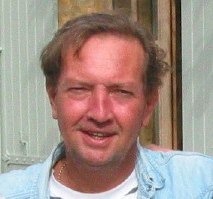 Martin Walker’s series of crime novels about the chief of police of a small town in the beautiful Perigord region of France are a delight. When we met at a recent “British Crime Fiction Night” in Darmstadt, Germany, he described the books as “French porn – wine, food, women – in a crime fiction frame.” Certainly Martin’s bon vivant personality matches the playfulness of his fiction (Though he's a Scot by birth, he divides his time between Washington DC and his vineyard in France). But he’s also a former correspondent with The Guardian and his novels have significant undertones of social commentary, as you’ll see from the interview here. By mixing the pleasures of France – the “porn” – with its dark underside, the Bruno novels remind me very much of the terrific Inspector Montalbano series, where the Sicilian setting is the beautiful backdrop to a detective who enjoys a good dinner as much as nabbing the villain. So here’s Martin Walker, the Andrea Camilleri of the Dordogne.
Martin Walker’s series of crime novels about the chief of police of a small town in the beautiful Perigord region of France are a delight. When we met at a recent “British Crime Fiction Night” in Darmstadt, Germany, he described the books as “French porn – wine, food, women – in a crime fiction frame.” Certainly Martin’s bon vivant personality matches the playfulness of his fiction (Though he's a Scot by birth, he divides his time between Washington DC and his vineyard in France). But he’s also a former correspondent with The Guardian and his novels have significant undertones of social commentary, as you’ll see from the interview here. By mixing the pleasures of France – the “porn” – with its dark underside, the Bruno novels remind me very much of the terrific Inspector Montalbano series, where the Sicilian setting is the beautiful backdrop to a detective who enjoys a good dinner as much as nabbing the villain. So here’s Martin Walker, the Andrea Camilleri of the Dordogne.How long did it take you to get published?
Not long at all. My first book, non-fiction, was commissioned. My first Bruno novel sold as soon as my agent offered it.
Would you recommend any books on writing?
No. Just read and read and read and get a feel for what works.
What’s a typical writing day?
There isn’t one, but whether on a plane or a train or at home or in a hotel I try and do at least a thousand words a day.
Plug your latest book. What’s it about? Why’s it so great?
The latest book is ‘The Dark Vineyard,’ third in the Bruno series, which is about fraud in the truffle market in France, which traces back to China and to consequences of France’s 1954 defeat in its failed colonial war in Vietnam. Along the way, it involves militant Greens, a lot of wonderful French food and the complex romantic life of my hero, Bruno. I think it’s my best Bruno novel yet, because he seems to grow as a character with each book and my portrait of modern France gets richer. While writing it, I more than once had that magical experience of a character doing something I had neither planned nor expected, as if Bruno was taking on a life of his own.
Read the rest of this post on my blog The Man of Twists and Turns.<\a>
Published on October 15, 2010 23:51
•
Tags:
andrea-camilleri, bruno-chief-of-police, cj-sansom, crime-fiction, dordogne, france, ian-rankin, inspector-montalbano, interviews, martin-walker, neal-stephenson, perigord, philip-roth, the-guardian, the-writing-life, washington-dc, writers



